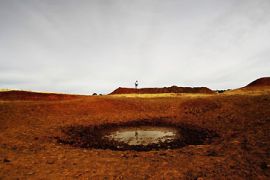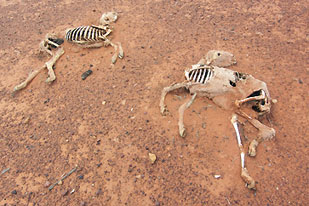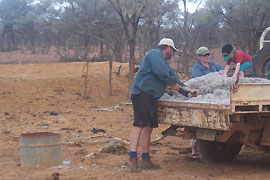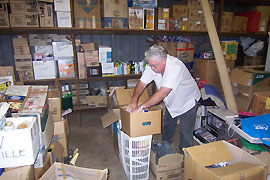Australia’s battle with drought
Years of drought bring ruin to rural communities and drive some to suicide.

 |
|
Six years of drought have devastated much |
Australia is in the grip of a drought the country’s prime minister has called “the worst in a century”. In some states, it has lasted for six years driving many rural areas into recession and dozens of farmers to the brink of suicide.
Al Jazeera’s Dan Nolan visited some of the worst-hit areas to see how people are coping.
Keep reading
list of 4 itemsAfter the Hurricane
World’s coral reefs face global bleaching crisis
Why is Germany maintaining economic ties with China?
In a drought as long as this one, rain can be a farmer’s worst enemy. Too much at the wrong time is fatal.
A rare thunderstorm during a freak cold snap killed 100 of Gordon Walker’s sheep. When the rain soaked their drought-ravaged bodies, they froze to death.
The much-needed storm water quickly ran off and evaporated leaving his 40,000 hectare property in far western Queensland, as dry as ever.
| The Big Dry |
|
In Queensland drought had been declared across 63 per cent of the state In Victoria the figure is close to 80 per cent In New South Wales it is 93 per cent Dams across Australia’s east at 20 per cent capacity, prompting severe water restrictions in Sydney and Melbourne. In New South Wales it is 93 per cent Dry conditions raise risk of bush fires |
“This area here should have eight inches of grass all over it,” Walker says pointing to a stretch of barren, parched earth. But there’s not a blade of grass in sight and the red soil makes it resemble a scene from Mars.
Walker has now resorted to cutting down mulga trees with a chainsaw so his starving cattle can eat the leaves. He also feeds them cotton seed – a cheap substitute for grain that is marginally more nutritious than the mulga leaves.
“It’s a bit better than starvation. It’s just a keep ’em alive situation that’s all you can do I suppose,” he says.
His pregnant wife Bernadette tells of the emotional toll the drought is taking on her and the couple’s two-year-old daughter, Alexandria.
“Everything comes back to the drought. You’re arguing so much more and you can’t go and see friends and you can’t afford to ring people and people don’t understand anyway so you don’t want to ring anyone,” Bernadette said.
Isolation is a common feeling in Australia’s remote farming areas and contributes to the high rate of suicide. Bernadette says it is something she has considered.
“It’s like any major tragedy or disaster it’s that heartbreaking,” she says. “And when there’s nowhere to turn it is an option and you’ve gotta consider all your options.”
 |
| Farming families like the Walkers are struggling to keep their livestock alive |
Thankfully the Walkers have never attempted that option but many others do.
The statistics say that one Australian farmer commits suicide every four days but rural counsellors such as Brian Egan believe the figure is much higher.
He runs a charity called Aussie Helpers providing food for starving stock and an understanding ear for depressed farmers.
“There’s been men living by themselves and I’ve found them hanging in a shed where they’ve just killed themselves or I’ve found a couple of people gassed in a car,” he says. “It’s very tragic and these deaths are not publicised at all.
Egan himself almost became a statistic too.
After losing his own farm in the 1990s he attempted suicide and spent a year in hospital recovering from depression.
 |
| Brian Egan’s charity has become a lifeline for desperate farming communities |
Anti-depressant drugs did nothing to help him shake off “the beast” as he calls it, so his doctors came up with a new idea.
“The programme they set out for me was to go out and help people who I thought were worse off than myself.
At the time, he says, “I thought that was a bit of a joke because I didn’t think anyone could be worse off than I was,” he said. But the new medicine worked.
Egan began to recover and five years later Aussie Helpers is distributing half a million dollars in aid to needy farmers.
Virtually every cent donated is given back to farmers with Egan refusing to take a wage for doing something he says is saving his life.
“I don’t think that I’d be here if I wasn’t doing this,” Egan says. “We’ve never set out to save the world. I think our job is to keep on visiting farmers, give a bit of counselling, help whenever we can with food and fodder and just keep their spirits up.”
According to Bernadette Walker, it is working.
“He understands what we’re going through,” she says.
“He’s doing what he can for us, he can’t make it rain but he can bring some coffee or some nappies or something so we don’t have to spend money on that.”
Bernadette, like every Australian farming family struggling for survival, is clinging onto the hope that drought-breaking rain will soon arrive. But the soil is now so dry that it will take regular steady rain spread over 3 months to bring an end to the misery.
“I don’t think there’s many emotional resources left to go on for too much longer. We don’t know when it’s going to end. Do we just give up or do we keep fighting?” she asks.
Only time – and the weather – will tell.
To find out more about the work of Aussie Helpers, go to www.aussiehelpers.org.au/